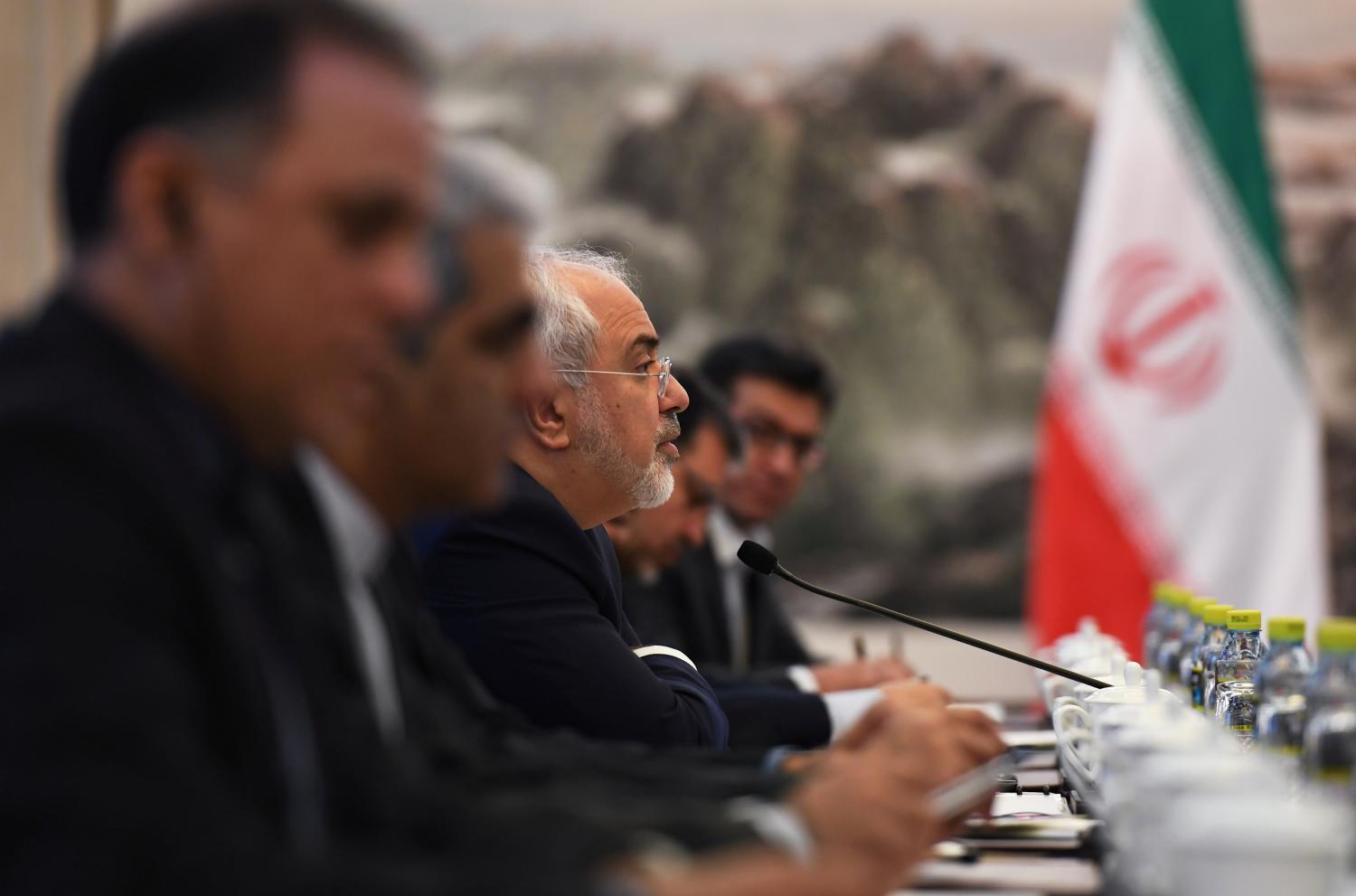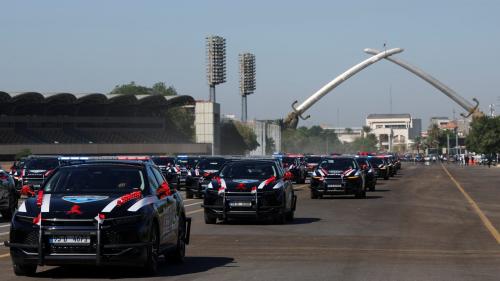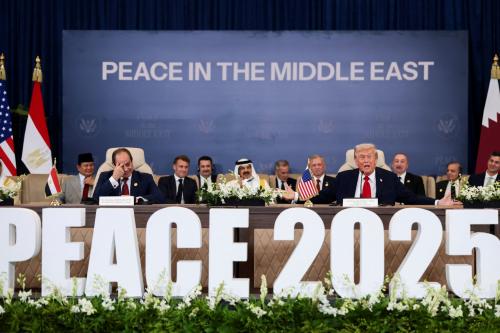I’ve resisted the urge to comment much on the Iran negotiations, in part because I wanted to support a deal and, now that it’s been struck, I do – but with major reservations. I can’t help feeling that we’ve paid a tremendous cost for what can only be described as a narrow – if understandable – focus on the minutia of Iran’s nuclear program, including extremely technical questions about, for example, centrifuges. I’ve found it hard to relate to this sort of discussion, because I’ve never quite seen Iran’s nuclear capability as the issue. Iran’s nuclear program mattered of course, but it mattered more because of the kind of regional actor Iran happened to be (if Iran was a U.S. ally and a democracy, we’d be having a different conversation). Our Gulf allies, for all their faults, recognized this. For them, this – Iran’s destabilizing role in the region – was what worried them most. And while they exaggerated Iran’s meddling, while conveniently eliding their own, they were right to view Iran as a fundamentally negative force in places like Syria and Lebanon.
The Obama administration underscored time and time again that this wasn’t about Iran’s other activities in the region: it was about the nuclear program. This, I gathered, was intended to reassure, but its effect was the opposite. Sure, any Iran deal depended on “dissociating” the nuclear issue from everything else, but the problem was that everything else mattered a whole lot, and perhaps just as much. To the extent that a successful deal – and keeping the Europeans on board – depended on “siloing,” the drawbacks of a deal were built in to the process. These starting assumptions did not start with President Obama, but with Bush, a fact all too often ignored.
Administrations can, of course, “walk and chew gum at the same time,” but that neglects the interrelated nature of Middle East conflicts. The boutique case-by-case approach to the region that Obama has championed sounds smart and nuanced in theory – a welcome respite from Bush’s self-consciously grandiose frameworks – but if the Arab Spring underscored anything, it’s that politics are rarely only local. In nearly every major crisis and conflict – whether in Syria, Iraq, Yemen, Libya, Egypt, Lebanon, or Bahrain – external actors with regional ambitions have played an outsized, even decisive role.
It’s difficult to believe in the durability of Egyptian authoritarianism without understanding Saudi Arabia and the United Arab Emirates’ view of the Muslim Brotherhood as a transnational and not just a local threat. In Iraq, Iran seems like a potential (or actual) partner in the war on ISIS, until you realize that Iran is the determined patron of the Syrian regime, whose brutality has fueled ISIS’ rise to prominence. Meanwhile, the Obama administration’s “Iraq-first” strategy against ISIS seems reasonable, until you realize our opponents treat Iraq and Syria as a combined theater, and that the fact that we don’t puts us at a profound disadvantage. In short, thinking that we can “silo” the Iranian nuclear issue, or even Iran, suggests a detachment from the region’s realities as they’re actually lived.
It is fairly easy (at least for most people) to actually walk and chew gum at the same time. Doing one doesn’t affect the other, which makes it an inapt metaphor for policymaking. The Obama administration’s decision to focus on Iran’s nuclear program and, to a lesser extent, the Israeli-Palestinian conflict meant that we could, and would, do less of other things, and do them less well. Political capital and bandwidth are finite resources. Policymaking is about to deciding what to prioritize, particularly when the president and a small coterie of close advisors are pulled in a seemingly endless number of competing directions.
When it comes to allies – especially ones that become nervous rather quickly and act rashly when nervous – you can afford to alienate them, but only up to a point. So you pick your battles. We wanted the Saudis to limit their public criticism of the Iran talks and to go along with them, however grudgingly. We knew this was asking a lot, which made it difficult to make other big asks, on, say, putting pressure on the Sissi regime in Egypt to be even just a tiny bit less repressive. But it is perhaps in Yemen where the most damage has been done. (And this isn’t just about the civil war. From 2011 onwards, we outsourced our Yemen policy to Saudi Arabia, which didn’t work so well. To correct this, we outsourced our Yemen policy to Saudi Arabia).
It’s no secret that our Gulf allies feel that we haven’t done nearly enough to counter Iran’s ambitions in the region. The fact that Obama seems to hold out hope that a deal could help rehabilitate Iran both regionally and internationally doesn’t help matters. But, putting that aside, we do know that Saudi Arabia and other Gulf countries opted to launch a destructive intervention in Yemen, at tremendous human cost, in part because of fears of U.S. disengagement and nervousness over U.S. policy toward Iran. As Ken Pollack recently testified to Congress: “In private, GCC officials make no bones in saying that they felt compelled to [intervene in Yemen] because the United States was embracing Iran rather than deterring or defeating it.” American officials, despite having major qualms about the intervention, had little interest in picking a fight with Saudi Arabia over Yemen, when they were already expending their political capital to reassure the Saudis about the Iran negotiations.
Then there’s Syria. It was clear from the start of the uprising that Obama did, in fact, have a clear objective – minimizing U.S. involvement as much as possible. But there are other places, such as Iraq, where the Obama administration was pulled back in despite (or, more likely, because of) its best efforts. The unwillingness to rethink Syria strategy in any serious way has been reinforced by the momentum of the Iran negotiations. Why rock the boat and potentially provoke a major international incident, when progress was being made on Iran’s nuclear program? Why even take the chance with so much at stake? “Linkage,” moreover, was been built in to the policy process. As the journalist Josh Rogin noted: “All Syria proposals at State must go through the office of the undersecretary for political affairs, Wendy Sherman, who is also the administration’s lead negotiator over a nuclear deal with Iran.”
On the specifics of a deal, I tend to think, like many, that the U.S. made too many concessions, without getting enough in return. According to the New York Times, in the final days of talks, a television anchor on a hardline Iranian channel said: “The fact is, Obama needs this deal much more than we do.” She went on: “The American president needs a victory, and only a deal with Iran can give him that. They have retreated on several issues and compromised on their own red lines.” Whether or not this perception is fair, it’s a perception nonetheless, and perceptions drive behavior.
Others have noted that Iran, due to its deteriorating economy, needed a deal more than the U.S. did. This is almost certainly true. But while Iran may have needed it more, the U.S. wanted it more – or, at the very least, seemed like it did. Some of this, to be fair, was outside the U.S.’s control. The perception had already solidified throughout the region, drawing on 6 years of observing the Obama administration’s handling of various crises, most notably the backing down from stated “red lines” in Syria. Allies, such as Egypt, and enemies, such as Syria, have grown confident that we’ll blink first in a staring contest, in part because we usually do. This was why I was skeptical that any final deal could ever be the best possible deal. The administration has had tendency to misuse and/or underestimate its leverage in some of our most important bilateral relationships. As the negotiations wrapped to a close, there was no obvious way to address this. It was too late. We couldn’t change how Iran viewed the Obama administration.
There was a related asymmetry during the negotiations. As Pollack writes, “I don’t think that Iran values a nuclear deal as much as it does its positions in these various countries.” With us, it was the reverse: we cared less about Iran’s positions in various countries and more about its nuclear program. This, too, was built in to the talks.
Some are troubled that most people had strong opinions about the deal before reading the actual text of the agreement. One certainly hopes that legislators will eventually read at least some of it. But the specifics of the deal aren’t, ultimately, as important as the broader issues and implications, and those aren’t anywhere to be found in the text. Here, I tend to agree with my colleague Jeremy Shapiro who argued in April that that the devil wasn’t in the details. The details “really don’t matter.” He goes on: “At heart, this is a fight over what to do about Iran’s challenge to U.S. leadership in the Middle East and the threat that Iranian geopolitical ambitions pose to U.S. allies.”
In other words, your position on the Iran deal is likely to depend on how you view the Middle East and America’s role in it more broadly. If you see the Syrian civil war as a, or even the, core regional conflict, then you’re probably worried about the $100 billion in potential sanctions relief. Iran, even we assume it chooses butter over guns as American officials hope and uses, say, only 3 percent of that total, will have $3 billion more to prop up the Syrian regime and other regional allies and proxies. It also depends on your starting assumptions about the nature of the Iranian regime. Are Iranian leaders “rational,” and do you think it matters whether “moderates,” such as President Rouhani and Foreign Minister Zarif, are empowered over their “hardline” counterparts?
For me, at least one other issue comes into play, and it’s a factor which has pushed me to be more supportive of the Iran deal than I expected to be. It’s striking how little discussion there has been about what Iranians think and want. As small-d democrats, Americans should always at least take into account public opinion in other countries. Presumably, Iranians know their country better than American politicians do. According to opinion polls, a majority of Iranians favor a deal. We all saw the pictures of ordinary Iranians celebrating the framework agreement in April. This time around, the regime has been more careful, closing off public spaces, with hardliners warning of the dangers of Iran Deal-induced “happiness.” Importantly, as Nader Hashemi notes, “some of the most vociferous defenders of a nuclear deal with the West are Iranian civil society and human rights activists.” It makes little sense for us to say that an Iran deal will make progress on human rights less likely, when Iran’s own human rights activists seem to think the opposite. In a survey of 22 leading human rights activists, support for ongoing negotiations was “unanimous,” while over half believed that a deal would lead to a significant improvement in human rights in Iran. Of course, they could be wrong, but we shouldn’t bet on that.
To be sure, the link between a deal and the empowerment of Iranian reformers, as intuitive as it might seem, is far from guaranteed. As many have noted, conservatives may be just as likely to gain from a deal for any number of reasons. What seems inescapable, however, is that the failure of negotiations would have been a major, perhaps even decisive loss for Iran’s reformist trend. President Hassan Rouhani, who buoyed expectations with his come-from-behind election victory two years ago, has been losing popularity and goodwill. On human rights, he pledged to expand personal freedoms and broaden space for civil society. As for the economy, it can sputter along, as it has, but without sanctions relief, Rouhani’s hands are tied. His raison d’etre, then, depends on a successful deal. Without one, we would have likely had more of the same: conservatives in control and dominating the country’s politics. Now at the least there is a glimmer of possibility, even if the road toward substantive reforms remains a difficult one.
Taking these various, and very different, factors into account, the deal is, on balance, a mixed bag. I don’t think an Iran nuclear deal deserved the near-obsessive focus it received from this administration. Too much was subsumed and compromised due to the desire for a deal, an administration priority which took precedence over nearly everything else. Now that a deal has been concluded, U.S. officials may have more room to maneuver. Of course, the implementation of a deal will still require constant attention, to say nothing of the domestic fight which is still to come. But perhaps, at some point, the U.S. will be able to act and think beyond Iran’s nuclear program and re-focus attention on the broader issues and conflicts in which Iran plays a major role. The U.S. will now come under pressure to “compensate” (or overcompensate depending on your perspective). It will need to reassure skeptical Gulf allies that it will do more to counter Iran’s regional designs. I agree with Ken Pollack that the best place to do this is probably in Syria. As he writes: “In the aftermath of an Iranian nuclear deal, finally executing the Administration’s proclaimed strategy for Syria, may be the best and only way to regain control over the dangerous confrontation escalating between Iran and America’s Arab allies.”
Now that President Obama’s legacy, however controversial, is secure (both on domestic and foreign policy), he can afford to do the very things he wasn’t willing to do when Iran negotiations were the overwhelming focus. That doesn’t mean he will do them, but that’s where, I hope, the debate over a post-Iran deal Middle East can now turn.
The Brookings Institution is committed to quality, independence, and impact.
We are supported by a diverse array of funders. In line with our values and policies, each Brookings publication represents the sole views of its author(s).




Commentary
Why I’m torn about the Iran deal: Was it worth it?
July 15, 2015